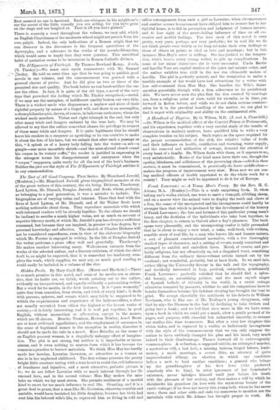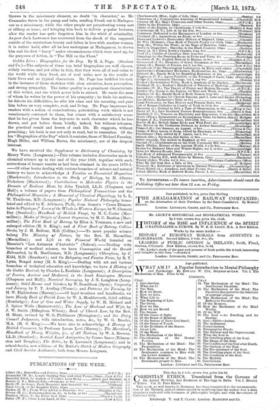Frank Lawrence; or, A Young Man's Fancy. By the Rev.
IL. G. Adams, M.A. (Bentley.)—This is a truly surprising book.. If, when taking one's walks abroad, one were to meet a tranquil,. nibbling sheep, and on a nearer view the animal were. to display the teeth and claws of a lion, the sense of the unexpected and the incongruous could hardly be- stronger than that which is produced by the development of the history of Frank Lawrence; the fate and fortune of this particular young man's- fancy, and the destinies of the individuals who take boat together, in the first chapter, to return to Oxford after a day's pleasure. The book opens very pleasantly, and the unsuspeoting reader is fully persuaded that he is about to enjoy a rare treat, a calm, well-bred, well-written, sensible story of real life, by a man who knows life and human nature,. a sort of pleasant conversationarnarrative, with a few thoroughly studied types of character, and a setting of events neatly contrived and arranged to exhibit and embellish them. Moral, of course, and pro- bably religious, but not offensively so, not a disguised. tract, something different from the ordinary three-volume article turned out by the cartload ; not wonderful, probably, but at least fresh. So we start fair, rather liking the University flavour in the talk and the topography, and decidedly interested in lazy, poetical, outspoken, gentlemanly Frank Lawrence : perfectly satisfied that he should find a. splen did beauty, an astonishing painter, and the most superb singer of Spanish ballads of chivalry in the world, in a rustic cottage otherwise tenanted by peasants, whither he and his companions have to betake themselves because his indolent steering has brought the boat to• grief. We accept cheerfully the antithesis to his defects in William Novinson, who is like one of Mr. Trollopo's young clergyman, only that he nips the likeness in the bud by declining to take Orders and going into a bank ; and we feel that once more in life we have oome upon a book in which we could put a mark, after a gentle perusal of its pages, and purpose, with cheerful but unhurried sincerity, to resume our studies this time to-morrow. But after a very few chapters this- vision fades, and is replaced by a reality so ludicrously incongruous with the style of the commencement that we can only suppose the author to have suddenly changed his plan and his hand, very much indeed to their disadvantage. Thence forward all is extravagantly common-place. A seduction, a supposed suicide, an attempted murder, a mysterious will, a lost heir, a missing heiress, forged letters, hush money, a mock marriage, a secret ditto, an attorney of quite unprecedented villauy, an election in which one candidate bribes a meb to beat another candidate ; a general who brings. up the granddaughter of his first love (who preferred somebody else to him), in utter ignorance of her benefactor's existence, never indulges himself until just before his death with the pleasure of her society, and then makes a will by which he disinherits his grandson (in love with the mysterious beauty of the rustic cottage) if he does not marry this young lady, whom he has never• seen ; these and other odds and ends too numerous to mention are the Materials with which Mr. Adams has thought proper to work. Ho throws in the missionary element., no doubt ' in character,' as Mr. Grammies threw in the pump and tubs, sending Frank out to Madagas- car as a missionary, while the other people are perpetrating every sort of villany at home, and bringing him back to deliver p^pular lectures, after the reader has quite forgotten him in the whirl of criminality. .As poor Jack Lawrence has recovered from the shock of the supposed suicide of the mysterious beauty and fallen in love with another woman, it is rather hard, after all he has undergone at Madagascar, to drown him and his first " fancy " under circumstances which were used up, for the purroses of fiction, in The Mill on the Floss."







































 Previous page
Previous page